RBC Dominion Securities Inc. v. Merrill Lynch Case Analysis
VerifiedAdded on 2022/08/28
|5
|1595
|21
Report
AI Summary
This report analyzes the employment law case of RBC Dominion Securities Inc. v. Merrill Lynch Canada Inc., focusing on the dispute arising from employment contracts, breach of implied terms, and conflict of interest. The student disagrees with Justice Abella's opinion regarding compensation, supporting the re-establishment of the trial judge's award, except for the compensations related to unfair competition during the notice period. The report discusses the application of Employment Law in Canada, specifically addressing the duty of honesty and faithfulness of employees, referencing cases like Bee Chemical Co. and Durand v. Quaker Oats Co. The student agrees with the opinions of McLachlin CJ and his companions regarding the breach of good faith in the employment contract and the employee's right to compete after termination. The report also examines the Employment Standard Act 1996 and the importance of a fiduciary relationship. The conclusion supports the Supreme Court's decision and emphasizes the need for caution in decision-making.
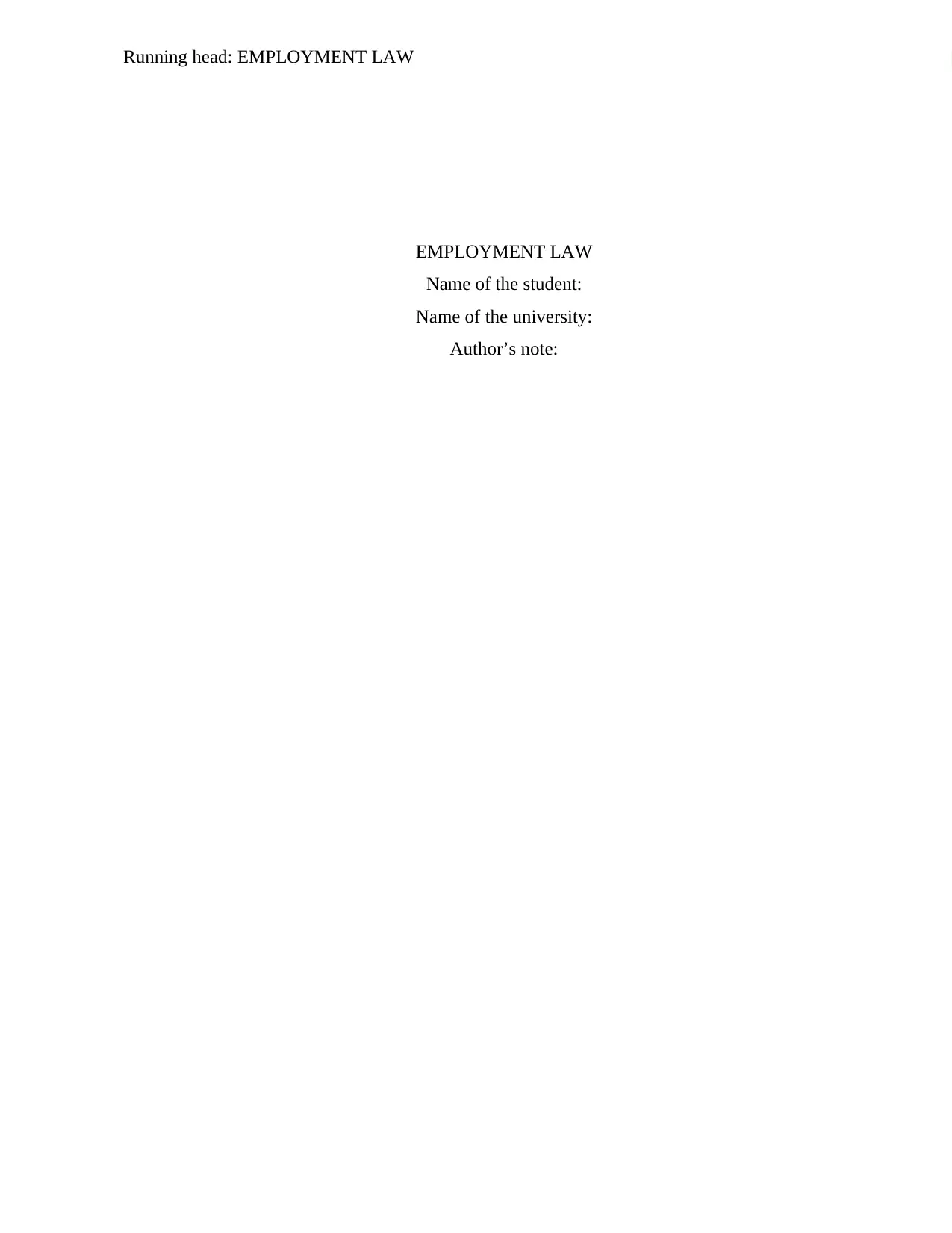
Running head: EMPLOYMENT LAW
0
EMPLOYMENT LAW
Name of the student:
Name of the university:
Author’s note:
0
EMPLOYMENT LAW
Name of the student:
Name of the university:
Author’s note:
Paraphrase This Document
Need a fresh take? Get an instant paraphrase of this document with our AI Paraphraser
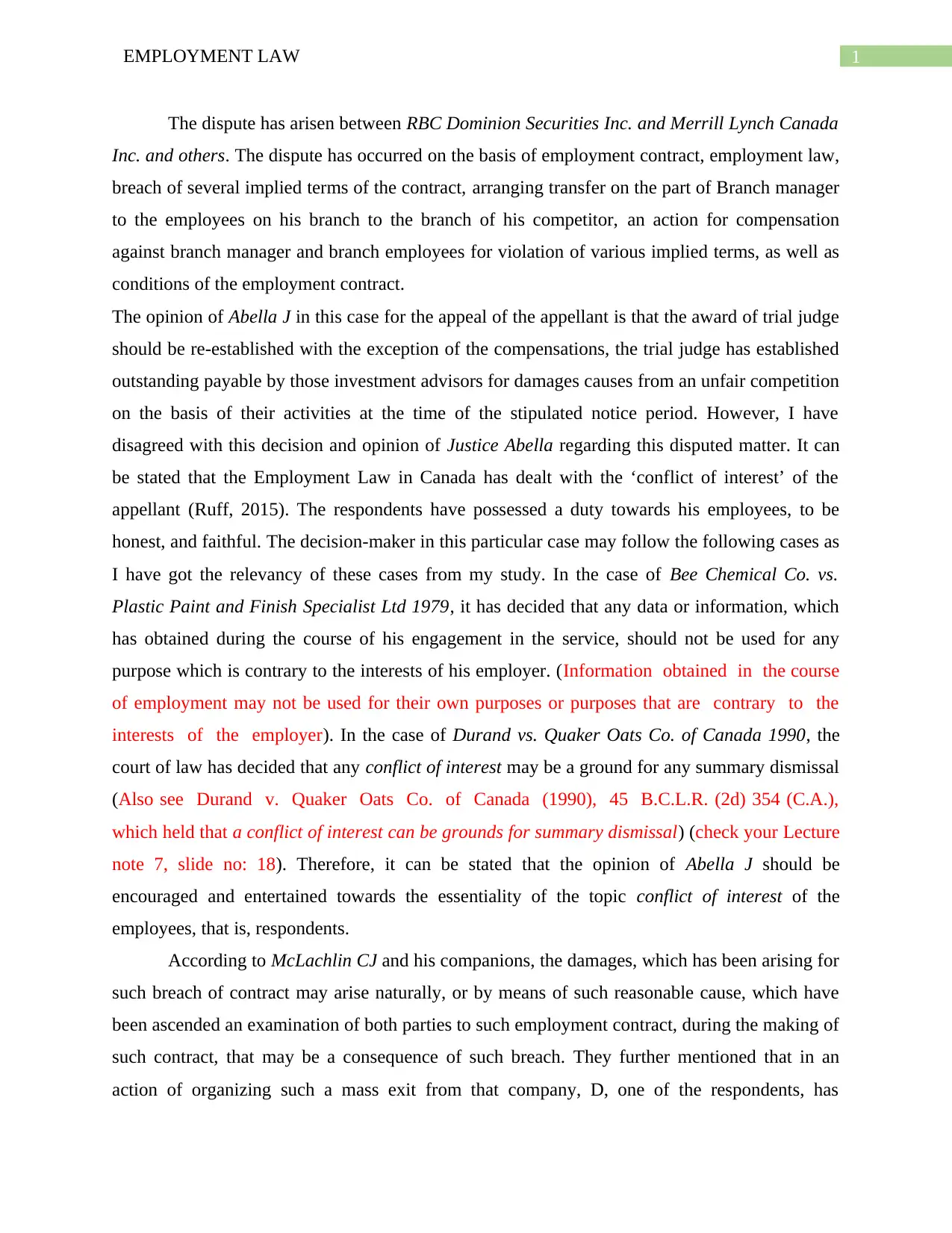
1EMPLOYMENT LAW
The dispute has arisen between RBC Dominion Securities Inc. and Merrill Lynch Canada
Inc. and others. The dispute has occurred on the basis of employment contract, employment law,
breach of several implied terms of the contract, arranging transfer on the part of Branch manager
to the employees on his branch to the branch of his competitor, an action for compensation
against branch manager and branch employees for violation of various implied terms, as well as
conditions of the employment contract.
The opinion of Abella J in this case for the appeal of the appellant is that the award of trial judge
should be re-established with the exception of the compensations, the trial judge has established
outstanding payable by those investment advisors for damages causes from an unfair competition
on the basis of their activities at the time of the stipulated notice period. However, I have
disagreed with this decision and opinion of Justice Abella regarding this disputed matter. It can
be stated that the Employment Law in Canada has dealt with the ‘conflict of interest’ of the
appellant (Ruff, 2015). The respondents have possessed a duty towards his employees, to be
honest, and faithful. The decision-maker in this particular case may follow the following cases as
I have got the relevancy of these cases from my study. In the case of Bee Chemical Co. vs.
Plastic Paint and Finish Specialist Ltd 1979, it has decided that any data or information, which
has obtained during the course of his engagement in the service, should not be used for any
purpose which is contrary to the interests of his employer. (Information obtained in the course
of employment may not be used for their own purposes or purposes that are contrary to the
interests of the employer). In the case of Durand vs. Quaker Oats Co. of Canada 1990, the
court of law has decided that any conflict of interest may be a ground for any summary dismissal
(Also see Durand v. Quaker Oats Co. of Canada (1990), 45 B.C.L.R. (2d) 354 (C.A.),
which held that a conflict of interest can be grounds for summary dismissal) (check your Lecture
note 7, slide no: 18). Therefore, it can be stated that the opinion of Abella J should be
encouraged and entertained towards the essentiality of the topic conflict of interest of the
employees, that is, respondents.
According to McLachlin CJ and his companions, the damages, which has been arising for
such breach of contract may arise naturally, or by means of such reasonable cause, which have
been ascended an examination of both parties to such employment contract, during the making of
such contract, that may be a consequence of such breach. They further mentioned that in an
action of organizing such a mass exit from that company, D, one of the respondents, has
The dispute has arisen between RBC Dominion Securities Inc. and Merrill Lynch Canada
Inc. and others. The dispute has occurred on the basis of employment contract, employment law,
breach of several implied terms of the contract, arranging transfer on the part of Branch manager
to the employees on his branch to the branch of his competitor, an action for compensation
against branch manager and branch employees for violation of various implied terms, as well as
conditions of the employment contract.
The opinion of Abella J in this case for the appeal of the appellant is that the award of trial judge
should be re-established with the exception of the compensations, the trial judge has established
outstanding payable by those investment advisors for damages causes from an unfair competition
on the basis of their activities at the time of the stipulated notice period. However, I have
disagreed with this decision and opinion of Justice Abella regarding this disputed matter. It can
be stated that the Employment Law in Canada has dealt with the ‘conflict of interest’ of the
appellant (Ruff, 2015). The respondents have possessed a duty towards his employees, to be
honest, and faithful. The decision-maker in this particular case may follow the following cases as
I have got the relevancy of these cases from my study. In the case of Bee Chemical Co. vs.
Plastic Paint and Finish Specialist Ltd 1979, it has decided that any data or information, which
has obtained during the course of his engagement in the service, should not be used for any
purpose which is contrary to the interests of his employer. (Information obtained in the course
of employment may not be used for their own purposes or purposes that are contrary to the
interests of the employer). In the case of Durand vs. Quaker Oats Co. of Canada 1990, the
court of law has decided that any conflict of interest may be a ground for any summary dismissal
(Also see Durand v. Quaker Oats Co. of Canada (1990), 45 B.C.L.R. (2d) 354 (C.A.),
which held that a conflict of interest can be grounds for summary dismissal) (check your Lecture
note 7, slide no: 18). Therefore, it can be stated that the opinion of Abella J should be
encouraged and entertained towards the essentiality of the topic conflict of interest of the
employees, that is, respondents.
According to McLachlin CJ and his companions, the damages, which has been arising for
such breach of contract may arise naturally, or by means of such reasonable cause, which have
been ascended an examination of both parties to such employment contract, during the making of
such contract, that may be a consequence of such breach. They further mentioned that in an
action of organizing such a mass exit from that company, D, one of the respondents, has
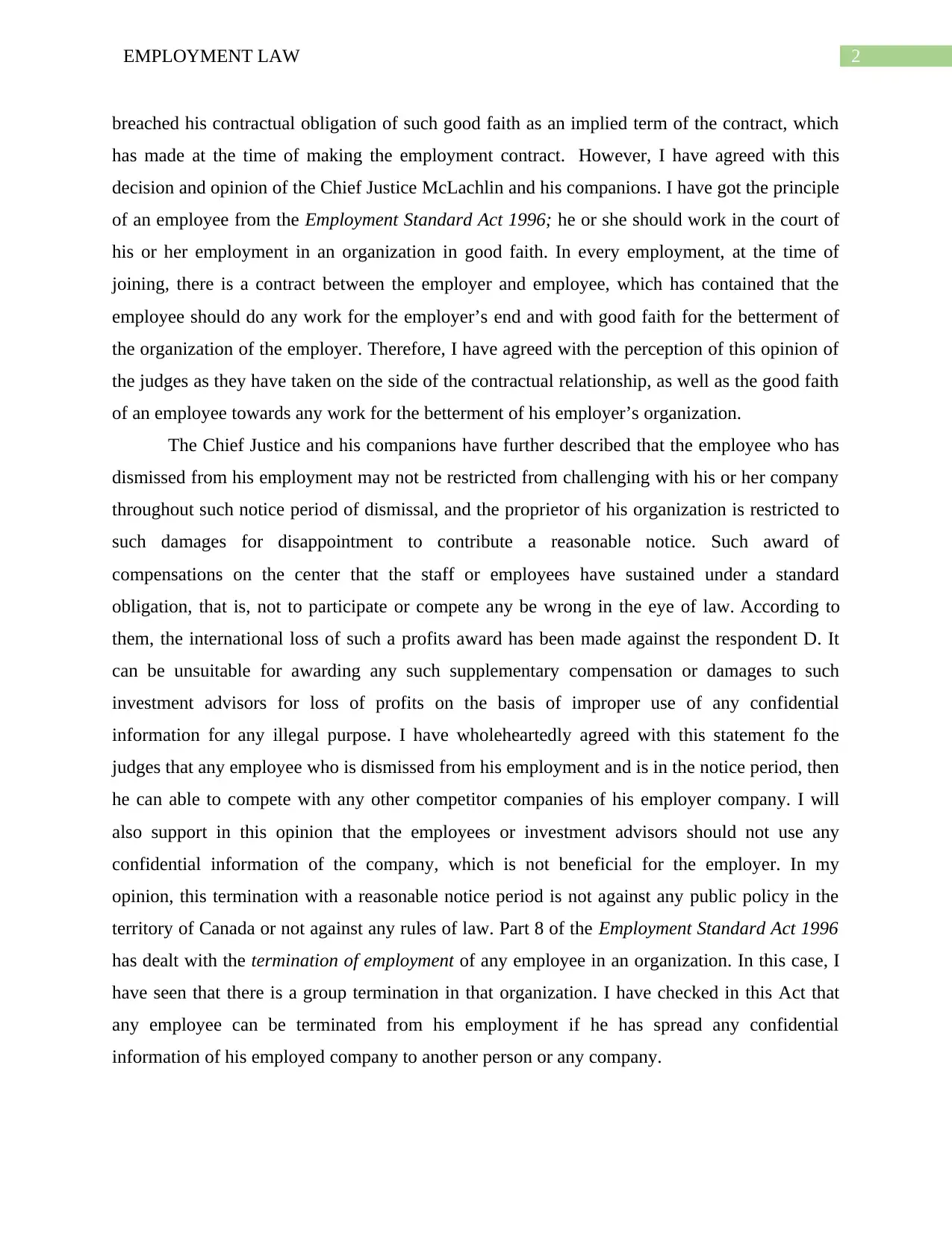
2EMPLOYMENT LAW
breached his contractual obligation of such good faith as an implied term of the contract, which
has made at the time of making the employment contract. However, I have agreed with this
decision and opinion of the Chief Justice McLachlin and his companions. I have got the principle
of an employee from the Employment Standard Act 1996; he or she should work in the court of
his or her employment in an organization in good faith. In every employment, at the time of
joining, there is a contract between the employer and employee, which has contained that the
employee should do any work for the employer’s end and with good faith for the betterment of
the organization of the employer. Therefore, I have agreed with the perception of this opinion of
the judges as they have taken on the side of the contractual relationship, as well as the good faith
of an employee towards any work for the betterment of his employer’s organization.
The Chief Justice and his companions have further described that the employee who has
dismissed from his employment may not be restricted from challenging with his or her company
throughout such notice period of dismissal, and the proprietor of his organization is restricted to
such damages for disappointment to contribute a reasonable notice. Such award of
compensations on the center that the staff or employees have sustained under a standard
obligation, that is, not to participate or compete any be wrong in the eye of law. According to
them, the international loss of such a profits award has been made against the respondent D. It
can be unsuitable for awarding any such supplementary compensation or damages to such
investment advisors for loss of profits on the basis of improper use of any confidential
information for any illegal purpose. I have wholeheartedly agreed with this statement fo the
judges that any employee who is dismissed from his employment and is in the notice period, then
he can able to compete with any other competitor companies of his employer company. I will
also support in this opinion that the employees or investment advisors should not use any
confidential information of the company, which is not beneficial for the employer. In my
opinion, this termination with a reasonable notice period is not against any public policy in the
territory of Canada or not against any rules of law. Part 8 of the Employment Standard Act 1996
has dealt with the termination of employment of any employee in an organization. In this case, I
have seen that there is a group termination in that organization. I have checked in this Act that
any employee can be terminated from his employment if he has spread any confidential
information of his employed company to another person or any company.
breached his contractual obligation of such good faith as an implied term of the contract, which
has made at the time of making the employment contract. However, I have agreed with this
decision and opinion of the Chief Justice McLachlin and his companions. I have got the principle
of an employee from the Employment Standard Act 1996; he or she should work in the court of
his or her employment in an organization in good faith. In every employment, at the time of
joining, there is a contract between the employer and employee, which has contained that the
employee should do any work for the employer’s end and with good faith for the betterment of
the organization of the employer. Therefore, I have agreed with the perception of this opinion of
the judges as they have taken on the side of the contractual relationship, as well as the good faith
of an employee towards any work for the betterment of his employer’s organization.
The Chief Justice and his companions have further described that the employee who has
dismissed from his employment may not be restricted from challenging with his or her company
throughout such notice period of dismissal, and the proprietor of his organization is restricted to
such damages for disappointment to contribute a reasonable notice. Such award of
compensations on the center that the staff or employees have sustained under a standard
obligation, that is, not to participate or compete any be wrong in the eye of law. According to
them, the international loss of such a profits award has been made against the respondent D. It
can be unsuitable for awarding any such supplementary compensation or damages to such
investment advisors for loss of profits on the basis of improper use of any confidential
information for any illegal purpose. I have wholeheartedly agreed with this statement fo the
judges that any employee who is dismissed from his employment and is in the notice period, then
he can able to compete with any other competitor companies of his employer company. I will
also support in this opinion that the employees or investment advisors should not use any
confidential information of the company, which is not beneficial for the employer. In my
opinion, this termination with a reasonable notice period is not against any public policy in the
territory of Canada or not against any rules of law. Part 8 of the Employment Standard Act 1996
has dealt with the termination of employment of any employee in an organization. In this case, I
have seen that there is a group termination in that organization. I have checked in this Act that
any employee can be terminated from his employment if he has spread any confidential
information of his employed company to another person or any company.
⊘ This is a preview!⊘
Do you want full access?
Subscribe today to unlock all pages.

Trusted by 1+ million students worldwide
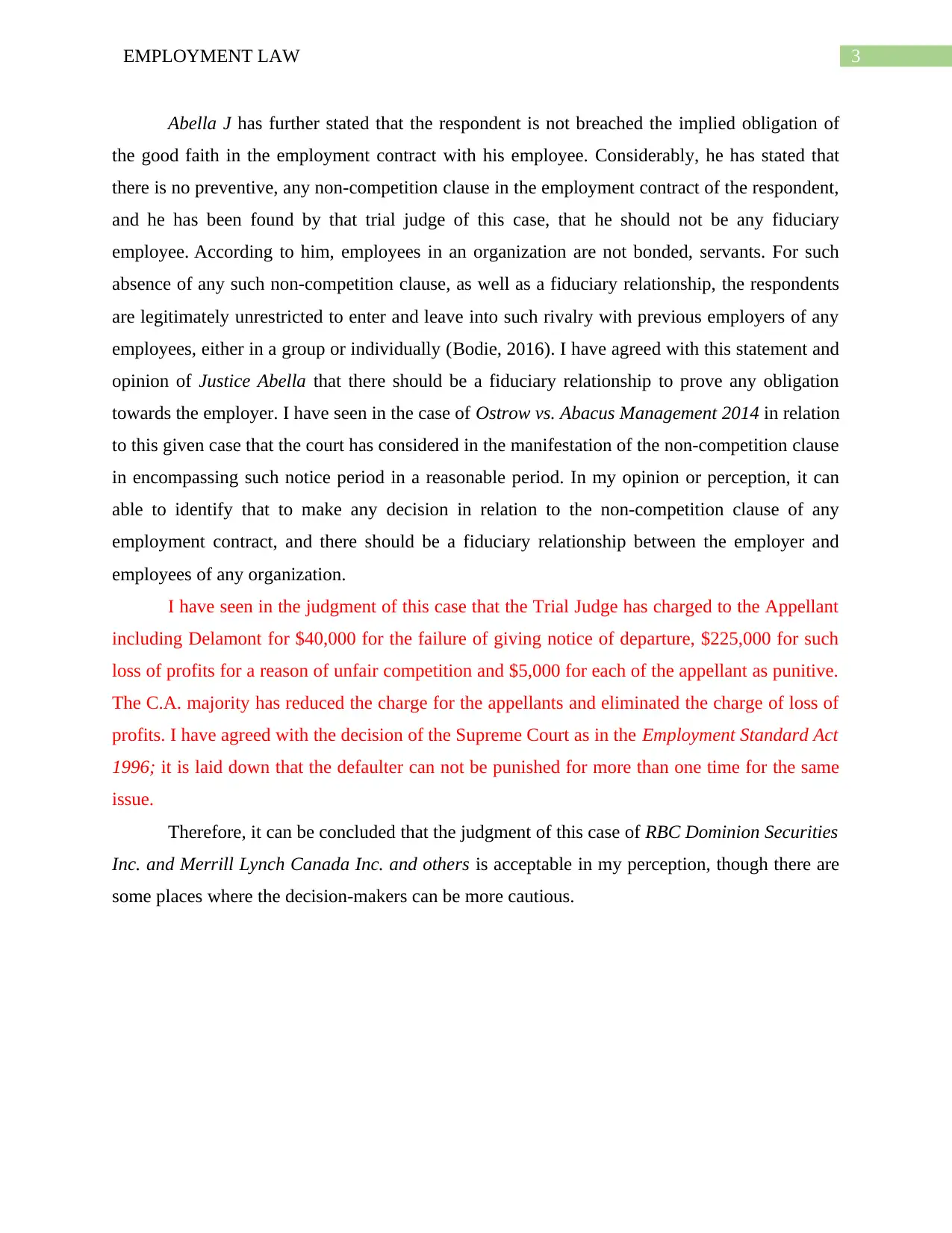
3EMPLOYMENT LAW
Abella J has further stated that the respondent is not breached the implied obligation of
the good faith in the employment contract with his employee. Considerably, he has stated that
there is no preventive, any non-competition clause in the employment contract of the respondent,
and he has been found by that trial judge of this case, that he should not be any fiduciary
employee. According to him, employees in an organization are not bonded, servants. For such
absence of any such non-competition clause, as well as a fiduciary relationship, the respondents
are legitimately unrestricted to enter and leave into such rivalry with previous employers of any
employees, either in a group or individually (Bodie, 2016). I have agreed with this statement and
opinion of Justice Abella that there should be a fiduciary relationship to prove any obligation
towards the employer. I have seen in the case of Ostrow vs. Abacus Management 2014 in relation
to this given case that the court has considered in the manifestation of the non-competition clause
in encompassing such notice period in a reasonable period. In my opinion or perception, it can
able to identify that to make any decision in relation to the non-competition clause of any
employment contract, and there should be a fiduciary relationship between the employer and
employees of any organization.
I have seen in the judgment of this case that the Trial Judge has charged to the Appellant
including Delamont for $40,000 for the failure of giving notice of departure, $225,000 for such
loss of profits for a reason of unfair competition and $5,000 for each of the appellant as punitive.
The C.A. majority has reduced the charge for the appellants and eliminated the charge of loss of
profits. I have agreed with the decision of the Supreme Court as in the Employment Standard Act
1996; it is laid down that the defaulter can not be punished for more than one time for the same
issue.
Therefore, it can be concluded that the judgment of this case of RBC Dominion Securities
Inc. and Merrill Lynch Canada Inc. and others is acceptable in my perception, though there are
some places where the decision-makers can be more cautious.
Abella J has further stated that the respondent is not breached the implied obligation of
the good faith in the employment contract with his employee. Considerably, he has stated that
there is no preventive, any non-competition clause in the employment contract of the respondent,
and he has been found by that trial judge of this case, that he should not be any fiduciary
employee. According to him, employees in an organization are not bonded, servants. For such
absence of any such non-competition clause, as well as a fiduciary relationship, the respondents
are legitimately unrestricted to enter and leave into such rivalry with previous employers of any
employees, either in a group or individually (Bodie, 2016). I have agreed with this statement and
opinion of Justice Abella that there should be a fiduciary relationship to prove any obligation
towards the employer. I have seen in the case of Ostrow vs. Abacus Management 2014 in relation
to this given case that the court has considered in the manifestation of the non-competition clause
in encompassing such notice period in a reasonable period. In my opinion or perception, it can
able to identify that to make any decision in relation to the non-competition clause of any
employment contract, and there should be a fiduciary relationship between the employer and
employees of any organization.
I have seen in the judgment of this case that the Trial Judge has charged to the Appellant
including Delamont for $40,000 for the failure of giving notice of departure, $225,000 for such
loss of profits for a reason of unfair competition and $5,000 for each of the appellant as punitive.
The C.A. majority has reduced the charge for the appellants and eliminated the charge of loss of
profits. I have agreed with the decision of the Supreme Court as in the Employment Standard Act
1996; it is laid down that the defaulter can not be punished for more than one time for the same
issue.
Therefore, it can be concluded that the judgment of this case of RBC Dominion Securities
Inc. and Merrill Lynch Canada Inc. and others is acceptable in my perception, though there are
some places where the decision-makers can be more cautious.
Paraphrase This Document
Need a fresh take? Get an instant paraphrase of this document with our AI Paraphraser
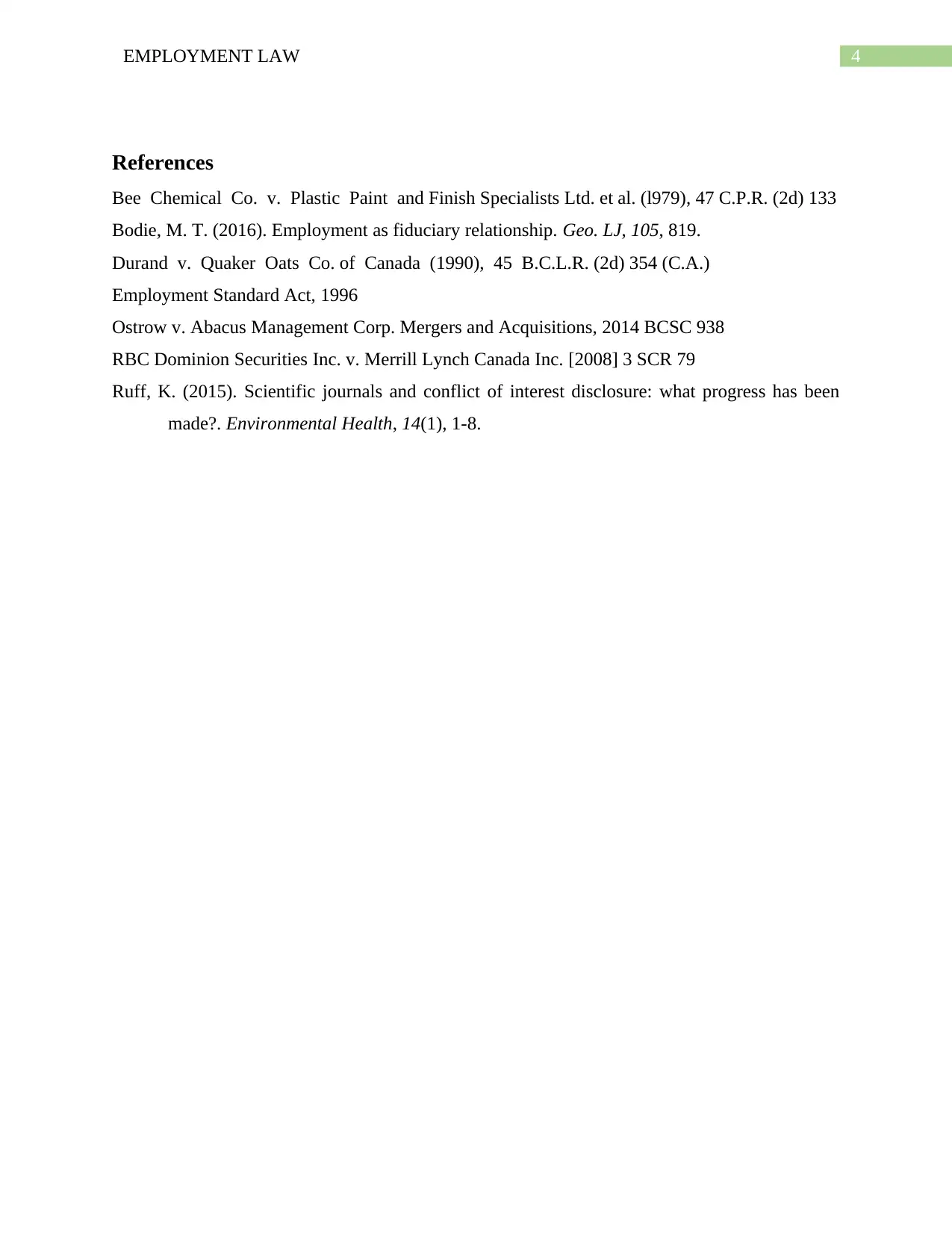
4EMPLOYMENT LAW
References
Bee Chemical Co. v. Plastic Paint and Finish Specialists Ltd. et al. (l979), 47 C.P.R. (2d) 133
Bodie, M. T. (2016). Employment as fiduciary relationship. Geo. LJ, 105, 819.
Durand v. Quaker Oats Co. of Canada (1990), 45 B.C.L.R. (2d) 354 (C.A.)
Employment Standard Act, 1996
Ostrow v. Abacus Management Corp. Mergers and Acquisitions, 2014 BCSC 938
RBC Dominion Securities Inc. v. Merrill Lynch Canada Inc. [2008] 3 SCR 79
Ruff, K. (2015). Scientific journals and conflict of interest disclosure: what progress has been
made?. Environmental Health, 14(1), 1-8.
References
Bee Chemical Co. v. Plastic Paint and Finish Specialists Ltd. et al. (l979), 47 C.P.R. (2d) 133
Bodie, M. T. (2016). Employment as fiduciary relationship. Geo. LJ, 105, 819.
Durand v. Quaker Oats Co. of Canada (1990), 45 B.C.L.R. (2d) 354 (C.A.)
Employment Standard Act, 1996
Ostrow v. Abacus Management Corp. Mergers and Acquisitions, 2014 BCSC 938
RBC Dominion Securities Inc. v. Merrill Lynch Canada Inc. [2008] 3 SCR 79
Ruff, K. (2015). Scientific journals and conflict of interest disclosure: what progress has been
made?. Environmental Health, 14(1), 1-8.
1 out of 5
Your All-in-One AI-Powered Toolkit for Academic Success.
+13062052269
info@desklib.com
Available 24*7 on WhatsApp / Email
![[object Object]](/_next/static/media/star-bottom.7253800d.svg)
Unlock your academic potential
Copyright © 2020–2025 A2Z Services. All Rights Reserved. Developed and managed by ZUCOL.